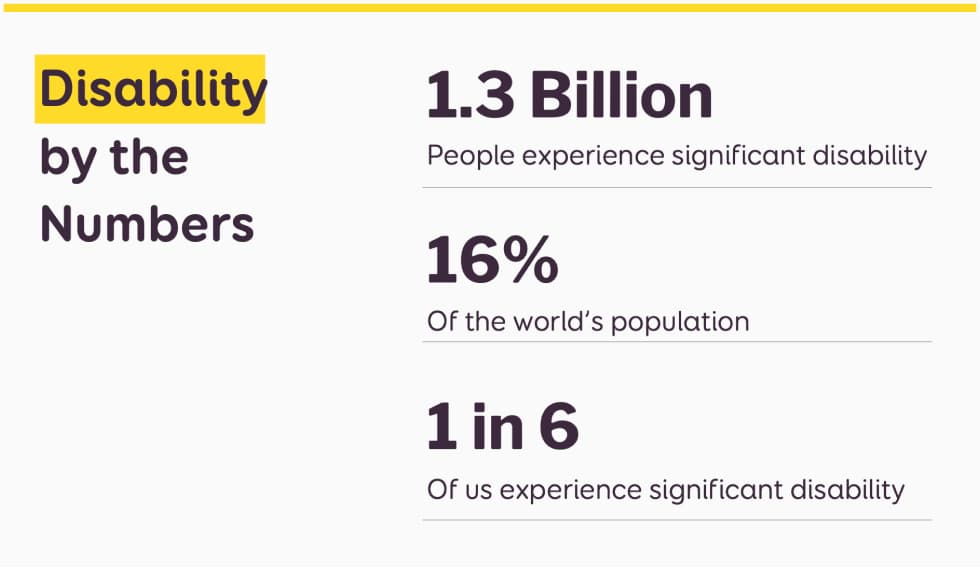
How to Convince People to Care — and Invest — in Accessibility
Accessibility isn’t just a compliance checkbox. It’s a growth strategy, a reputational advantage, and a test of a company’s humanity. Here’s how the Romanian Diversity Chamber of Commerce (RDCC) helps organizations turn accessibility into measurable business value.
Accessibility: The New Metric of Business Maturity
For too long, accessibility has been treated as an afterthought — something companies will “get to later.” But the reality is clear: accessibility isn’t a bonus feature. It’s a business essential. As Stéphanie Walter puts it, “You can’t sprinkle accessibility on top of a product once it’s built — it needs to be baked in from the start.”
Globally, over 1.3 billion people live with a disability — that’s one in six consumers. Add their families and friends, and you reach a market influence of 73% of global consumers, controlling $13 trillion in disposable income. Yet many digital products, workplaces, and services still exclude them.
The question isn’t whether accessibility matters — it’s whether your business can afford to ignore it.

The ROI of Accessibility
Accessibility drives innovation, strengthens loyalty, and reduces risk. Research consistently shows that accessible products outperform their competitors by up to 50%, while every $1 invested in accessibility returns about $100 through better usability, reduced churn, and stronger brand trust.
From a corporate standpoint, accessibility delivers across three pillars:
- Revenue: Access to new markets and customer segments.
- Reputation: Trust through inclusive design and social responsibility.
- Regulation: Compliance with the upcoming European Accessibility Act (EAA) taking effect in June 2025 — now extending accessibility obligations to e-commerce, banking, telecom, and more.
The RDCC’s Accessibility Solutions team helps companies stay ahead of this curve — not just to avoid penalties, but to position themselves as leaders in ethical innovation.

From Obligation to Opportunity: How RDCC Helps
The Romanian Diversity Chamber of Commerce is the country’s first organization offering comprehensive accessibility and inclusion consulting, combining European regulatory expertise with hands-on implementation support.
- Accessibility Compliance & Auditing
RDCC conducts full-spectrum digital accessibility audits, testing websites, mobile apps, and digital platforms for compliance with WCAG 2.2, EAA, and EN 301 549 standards. This ensures that your brand isn’t just compliant — it’s inclusive by design.
- Accessibility Training & Capacity Building
Through tailored workshops, teams learn how to integrate accessibility into their daily work — from coding accessible websites to creating inclusive content and using assistive technologies. RDCC’s Accessibility Squad guides developers, designers, and managers toward lasting behavioral change.
- Inclusive Design & User Testing
Accessibility isn’t theoretical — it’s human. RDCC includes people with disabilities in real testing environments to ensure that design decisions reflect authentic user experiences.
- Accessibility Strategy & Long-Term Improvement
The Chamber supports organizations in building accessibility roadmaps, developing internal accessibility policies, and implementing ongoing monitoring and maintenance plans to track measurable progress.
- Disability Inclusion Strategy for Corporates
Accessibility extends beyond digital products. RDCC helps businesses design disability recruitment frameworks, improve workplace accessibility, and strengthen inclusive employer branding — turning compliance into culture.
The Tangible Outcomes for Corporates
Investing in accessibility through RDCC’s solutions brings clear results:
- Stronger Market Reach: Accessible products engage a wider audience, including the rapidly growing aging population.
- Improved Product Quality: Accessibility forces cleaner code, clearer design, and better usability — for everyone.
- Higher Employee Retention: Inclusive environments attract and keep diverse talent, boosting morale and innovation.
- Reduced Legal Risk: Proactive compliance avoids costly litigation and reputational damage.
- Enhanced ESG Performance: Accessibility supports the “Social” and “Governance” components of ESG, critical for investors and global partners.
Changing the Mindset: From “Why” to “How”
Convincing people to care about accessibility often requires reframing. Not everyone is moved by empathy, but nearly everyone is moved by results.
- “Accessibility is too expensive”? Fixing later costs more.
- “No one has complained”? They can’t complain if they can’t access your product.
- “It’s not our priority”? Risk, reputation, and reach are.
The truth is simple: inaccessibility costs businesses money and credibility every single day.
The Future Is Accessible — and It Starts Now
Accessibility isn’t a checkbox; it’s a cultural shift. As RDCC emphasizes, building an accessible workplace is not just about compliance — it’s about creating a culture of inclusion, respect, and innovation.
The organizations that act now — those that audit, train, and redesign with accessibility in mind — will be the ones defining the future of European business.
The others? They’ll be catching up.
Let’s build that future together.
